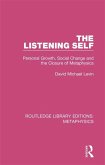Dieser Download kann aus rechtlichen Gründen nur mit Rechnungsadresse in A, B, BG, CY, CZ, D, DK, EW, E, FIN, F, GR, HR, H, IRL, I, LT, L, LR, M, NL, PL, P, R, S, SLO, SK ausgeliefert werden.
'This is a superb introduction to the philosophy of mind. Bayne focuses on fundamental aspects of mentality such as perception, thought, intentionality, consciousness, and the self, presenting the central debates in the field in a way that is both empirically informed and up to date. Each chapter is lucidly written and provides a skillfully crafted narrative. He has achieved the remarkable feat of writing a highly accessible book without ever sacrificing rigor or simplifying arguments. A jewel that belongs in every classroom!' - René Jagnow, University of Georgia, USA
'An ideal introduction to the subject by a leader in the field. It covers the traditional big questions, including the mind-body problem, mental causation, and self-knowledge. But it is also on the cutting edge, featuring detailed discussions of recent hot topics. And it is unique among introductions to the subject in giving a prominent place to both empirical considerations and a priori philosophical arguments. Lucidly written and neatly organized throughout, Bayne's introduction will be a delight for students and teachers alike.' - Adam Pautz, Brown University, USA
'Tim Bayne covers a diverse array of both traditional and cutting-edge topics with clarity, depth, and rigor, making this book an excellent introduction to philosophy of mind and a fantastic launching pad for further investigation. Highly readable and accessible, it is a pleasure to read!' - Angela Mendelovici, Western University, Canada
'This is a terrific book! Bayne accomplishes the near-impossible task of giving the reader a sense of both the core issues in philosophy of mind, and the current state of the discipline and where it's heading. Written in plain English, it does a very good job of explaining complicated issues in a clear manner.' - Raamy Majeed, University of Auckland, New Zealand
'This is a much-needed update to current introductory offerings in the philosophy of mind. Engaging and clear, Bayne presents philosophical problems in ways that will excite and motivate his readers. Most importantly, he demonstrates how empirical work can be used to evaluate philosophical theories, serving as an invaluable role-model for future generations of philosophers of mind.' - Jane Suilin Lavelle, University of Edinburgh, UK









